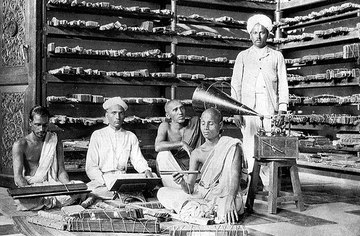Phonogram Archives of the Austrian Academy of Sciences
THE MOST IMPORTANT TASKS OF THE PHONOGRAM ARCHIVES
The main focus of the Phonogram Archives is the production, collection, analysis and long term preservation and thus a permanent availability of scientific acoustic and video recordings of all disciplines and without any regional restrictions. The Phonogram Archives have always put its focus on the annotation of preserved recordings which allowed for the kind of added value needed for further and diverse analysis of the collected audiovisual recordings. In order to fulfil its task the Phonogram Archives have promoted to a certain degree methodical and technical developments concerning recordings, reproduction, and retention of audio and video recordings since its foundation in 1899. On the other hand the availability of the collections, including the continuous edition of its historical collections (1899-1950: registered in the Memory of the World Register by the UNESCO) is being promoted significantly. Thus the activities of the Phonogram Archives are characterised by their interdisciplinary areas of work which is mirrored in the composition of its team (musicology, ethnomusicology, cultural and social anthropology, linguistics, specialists in the area of audio and video technics as well as IT). The Phonogram Archives owes its international reputation to this interdisciplinary approach.
The Phonogram Archives gains and increases its collections by the methodical and technical support of research projects and by acquisition of collections of Austrian researchers, as well as by their own research projects that break and have broken new ground concerning content and methods. The Archives have developed into a centre of competence for all sciences that use audiovisual records as the basis for their scientific research. This kind of expertise is in demand internationally and has resulted in worldwide consulting and training programmes. Alongside the above mentioned tasks, the Phonogram Archives is a research institute specifically as well as an archive that is under obligation to science and the regional and global public interest generally by playing an important role in preserving the cultural heritage. The Archives’ topicality is on show right now: due to social changes recent research records acquire historical significance ever more rapidly.
Office hours: Mo - Fri: 8:30 am to 4.30 pm
Visiting hours: 9:30 am to 11:30 am or by prior arrangement (see tel. no above)

